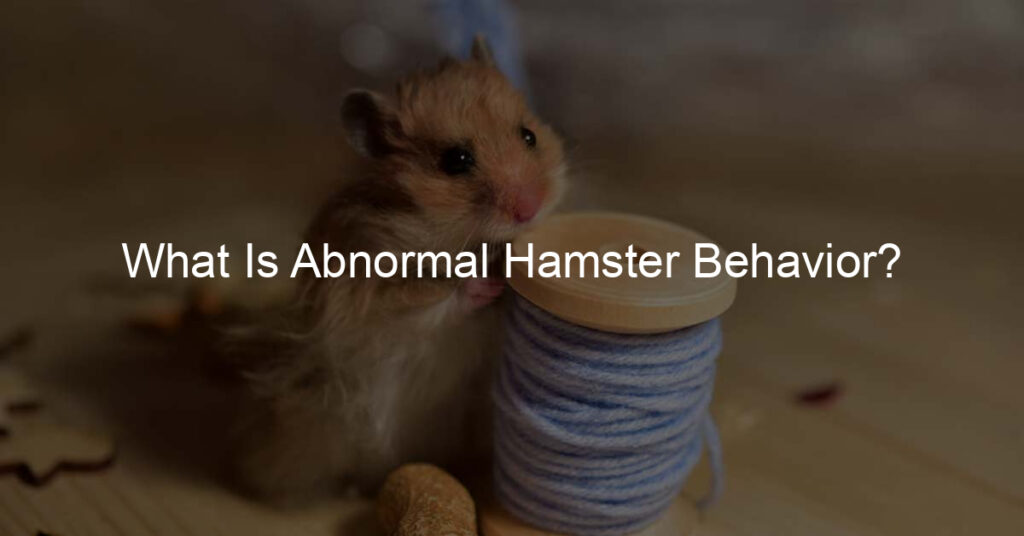Do you have a furry little hamster running around your home? These cute creatures make great pets, but sometimes their behavior can be puzzling. What is normal hamster behavior, and what is abnormal? Read on to find out!
How do you know if your hamster is not OK?
If something seems off with your hamster, you need to act quickly to ensure its health and safety. Signs of illness or distress can be subtle among small animals, so it’s important to be on the lookout for any unusual symptoms.
Check if your hamster’s eyes appear dull or lethargic, is eating noticeably less food than usual, or has frequent changes in activity levels.
Consider also if the texture of their fur has become less dense or if there is a decrease in grooming behaviors. Excessive scratching may indicate skin infection, as can sudden hair loss. In all cases, take them to a veterinarian as soon as possible for proper diagnosis and treatment.
What does a stressed hamster look like?
A stressed hamster can exhibit a variety of symptoms, often making it difficult to pinpoint if they are feeling overwhelmed.
Common signs include appearing more lethargic and not as active normally, losing their appetite, or overeating without gaining weight. They can also display increased aggression towards others in their cage, rapidly biting anything that comes near them.
Excessive grooming, such as bald patches on their fur, is another indicator of stress levels, showing they’re probably feeling overwhelmed and anxious.
In any case, it’s important to closely monitor your hamster’s behavior to know if they are feeling stressed, so you can take the necessary steps to reduce their anxiety and make them content again.
How do I know if my hamster is happy or sad?
When it comes to gauging the emotional state of a pet, hamsters are no exception. To avoid any confusion about whether your hamster may be sad or happy, look for a few key behaviors that will give you an indication of their mood.
A content hamster might be seen grooming itself frequently and playing with its toys.
On the other hand, if the animal is not eating well or appears excessively timid, this could indicate displeasure. If you ever feel uncertain of your hamster’s disposition, make sure to talk to your local veterinarian who can provide further guidance.
Do hamsters need daily attention?
Hamsters are adorable, captivating pets that many people draw joy from in their homes. They are very independent and love their alone time, but just like all animals, hamsters need attention and interaction to some degree.
Daily attention to your pet will not only keep them healthy, as you can monitor the behavior and any medical issues, but it will also create a deeper bond between you and the hamster.
This is important because social interaction has been proven to have both psychological and physical benefits for small rodents relative to their life span and health.
Regular playtime with your pet is essential for its mental stimulation, so carving out even 10 minutes per day for a couple of playful choices will bring immense happiness to you and the hamster.
How often should you clean the hamster cage?
Caring for a hamster requires cleaning up after them. It’s essential to devote adequate time and regularity to keeping their cages clean and fresh. To ensure your hamster has a healthy environment, it is recommended that the cage should be completely cleaned once per week.
Between these weekly thorough cleanings, it’s important to spot-clean as necessary, removing any feces or food that wasn’t eaten right away as well as tidying up any messes. Showing proper care and attentiveness will keep your pet happy, active, and healthy.
Do hamsters like it when you clean their cage?
Cleaning a hamster’s cage can be a delightful task for both you and the hamster! While some may worry that their lovable pet isn’t enjoying being taken out of its home every few weeks for a thorough cleaning, likely, your furry friend is excited about the change of scenery.
Hamsters love variety, exploration, and activity, so providing them with an opportunity to explore new parts of their environment while their cage is being cleaned is both enriching and enjoyable.
Plus, if they’re treated to a few yummy treats during cleaning then they’ll be extra motivated to join in the fun!
Conclusion: What Is Abnormal Hamster Behavior?
As we’ve discussed, abnormal hamster behavior is often a sign that something might be wrong with your beloved pet.
Paying close attention to your hamster’s behavior is the best way to ensure that it remains safe and healthy. When in doubt, don’t hesitate to contact a professional veterinarian for further advice; they can help diagnose and treat any abnormal behavior.
Furthermore, it’s important to give your hamster space in their habitat to practice natural behaviors such as nesting and hoarding. With enrichment activities, you can also stimulate their mind and get them active!
Above all else, keep your house clean and tidy so there are no potential dangers present that may harm your pet. Remember — when it comes down to it — the health of your hamster should always come first!








